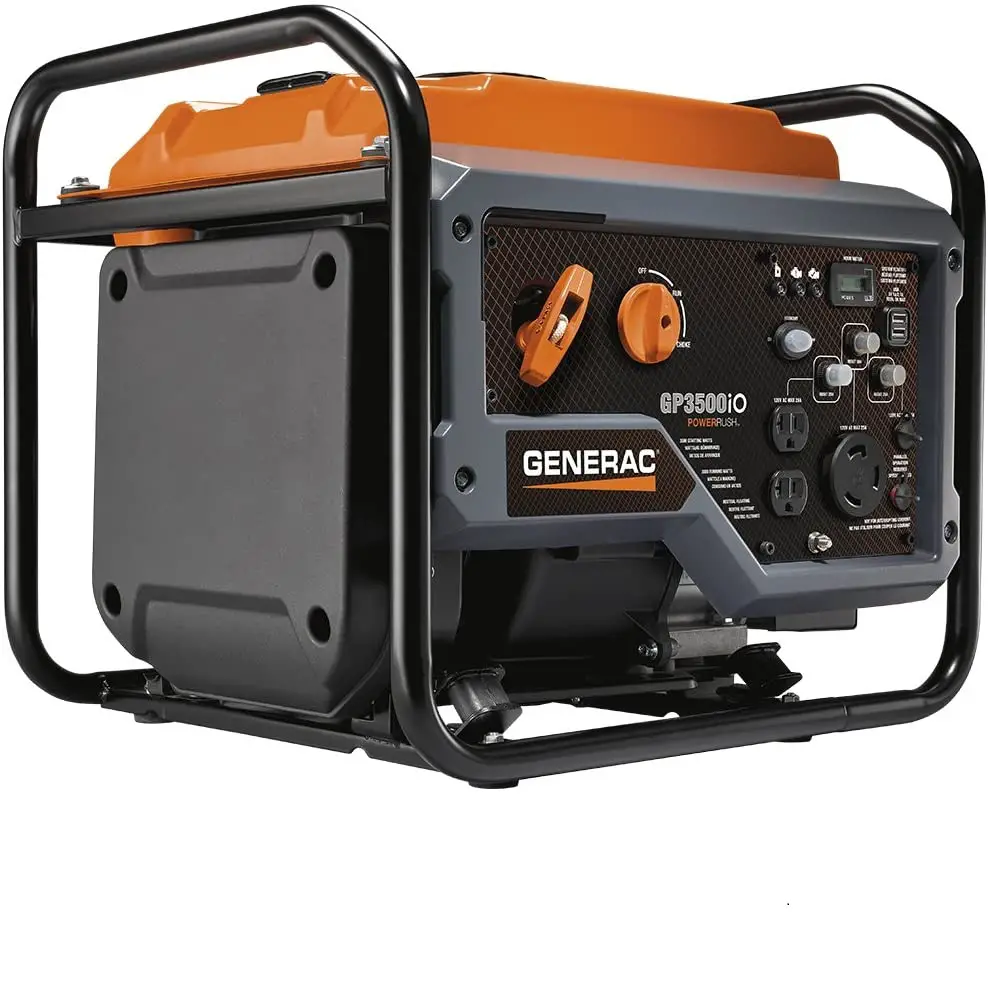
- Brand Generac
- Item Weight 74.3 Pounds
- Color Orange
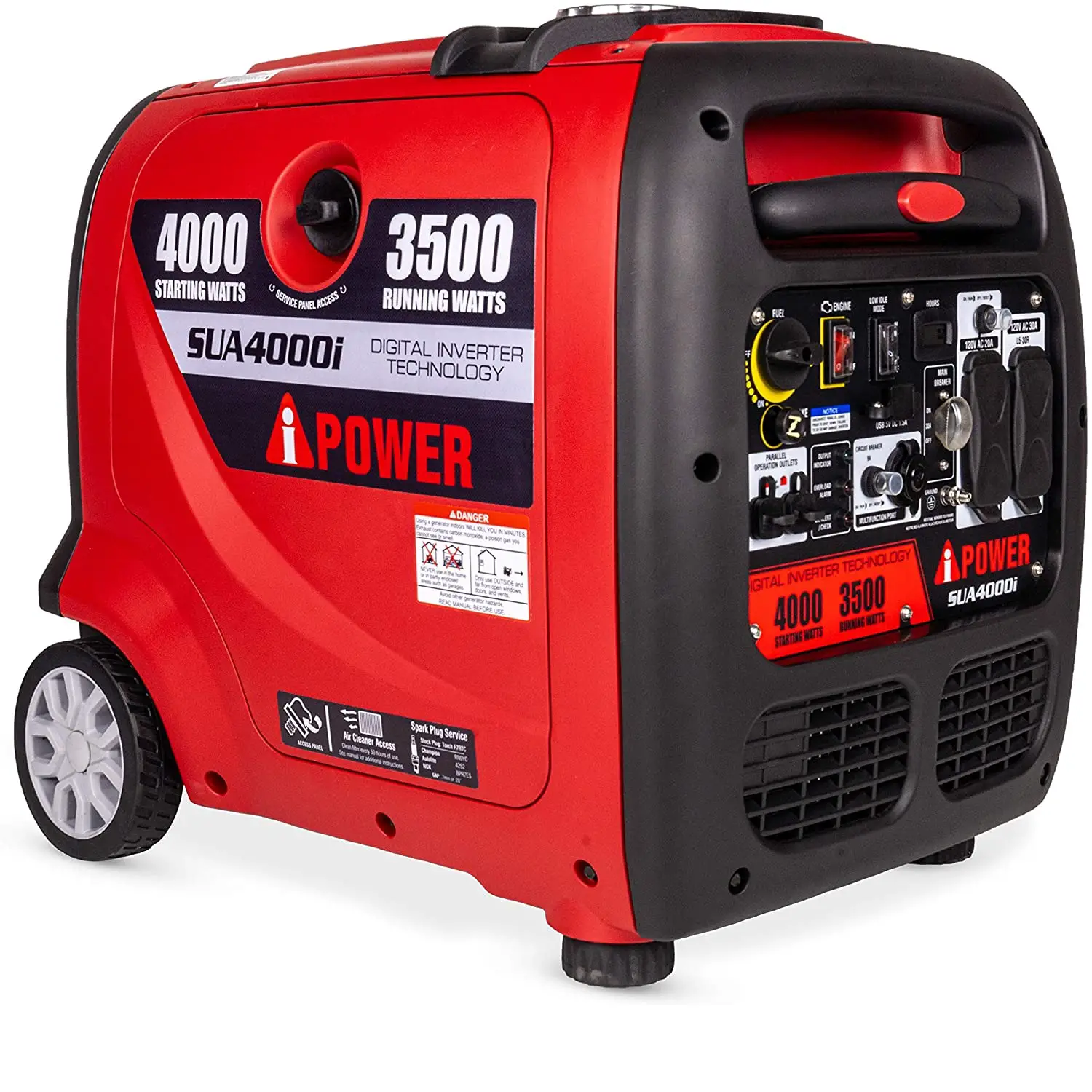
- Brand A-iPower
- Wattage 4000 watts
- Color RV Ready
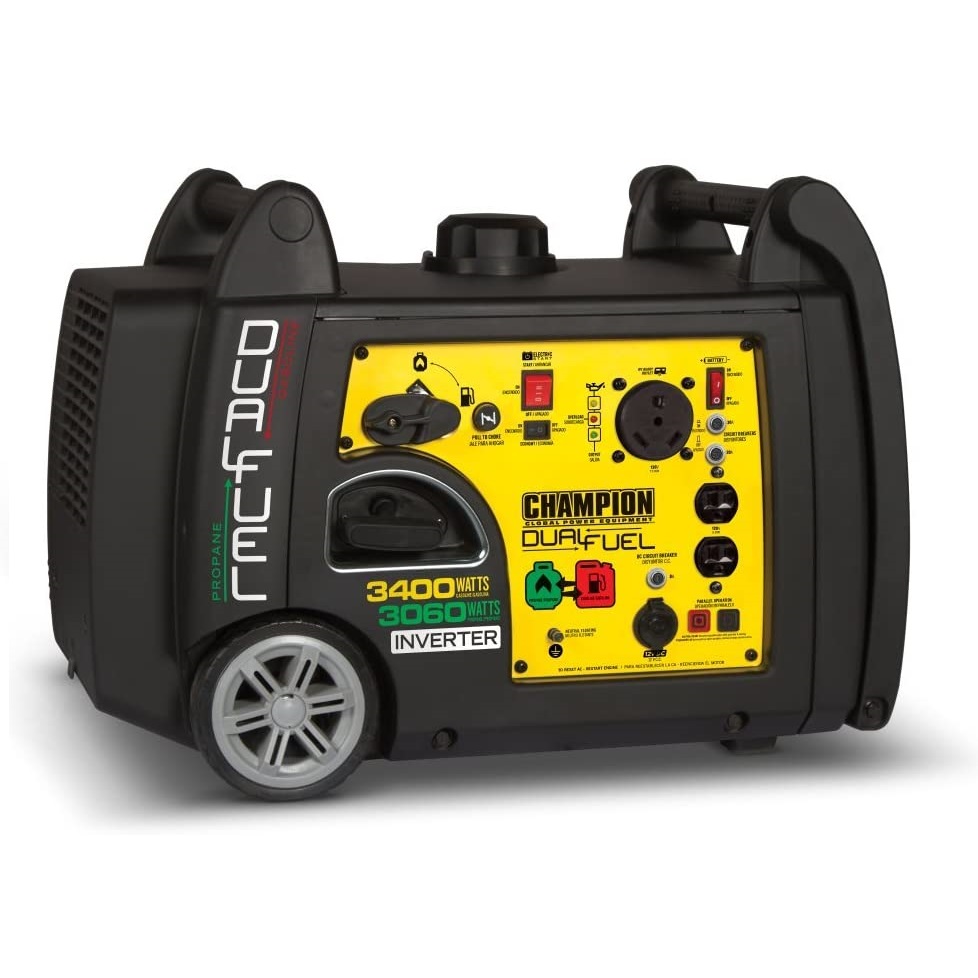
- Champion Power Equipment
- Wattage 3400 watts
- Item Weight 95.7 Pounds
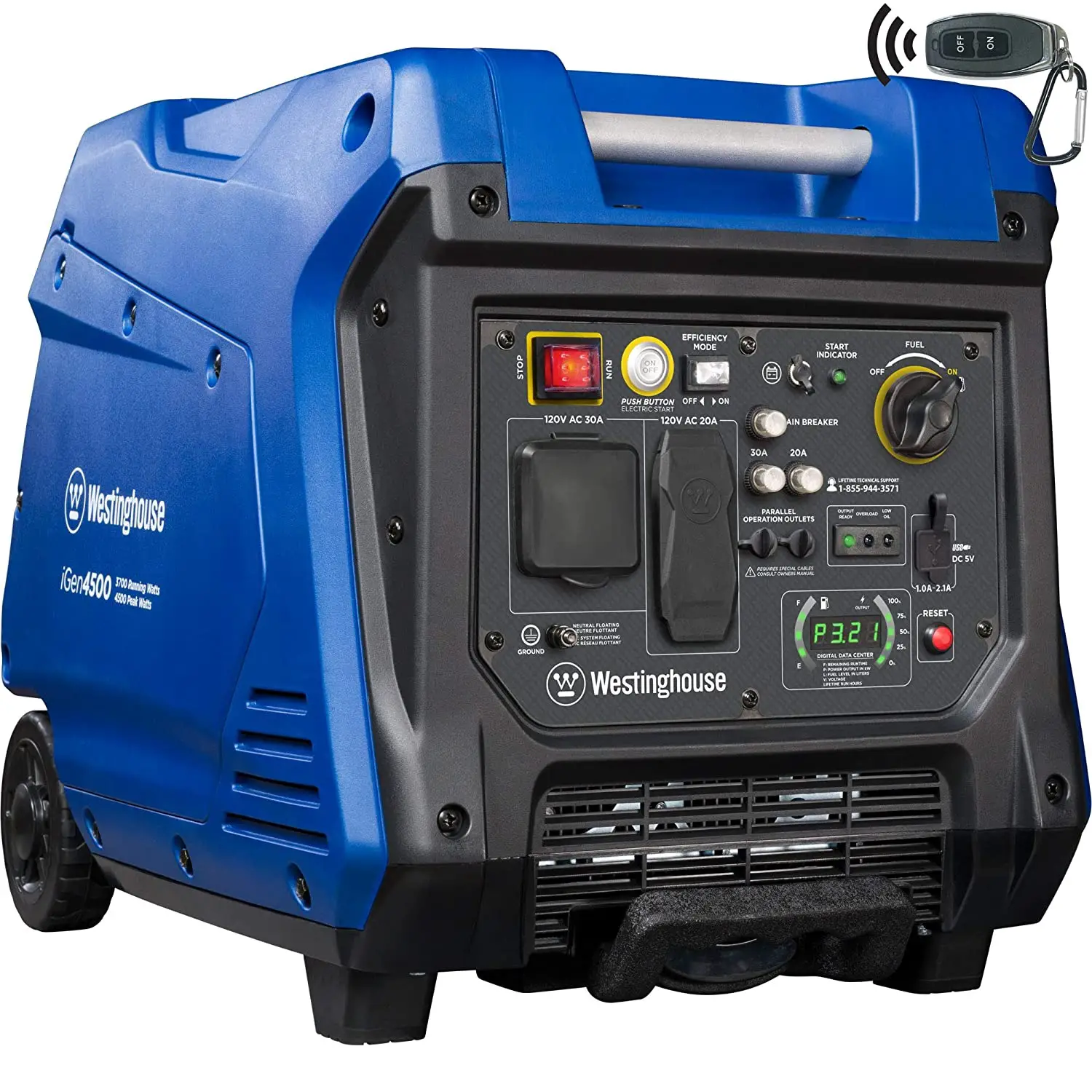
- Brand Westinghouse
- Wattage 4500
- Item Weight 93 Pounds
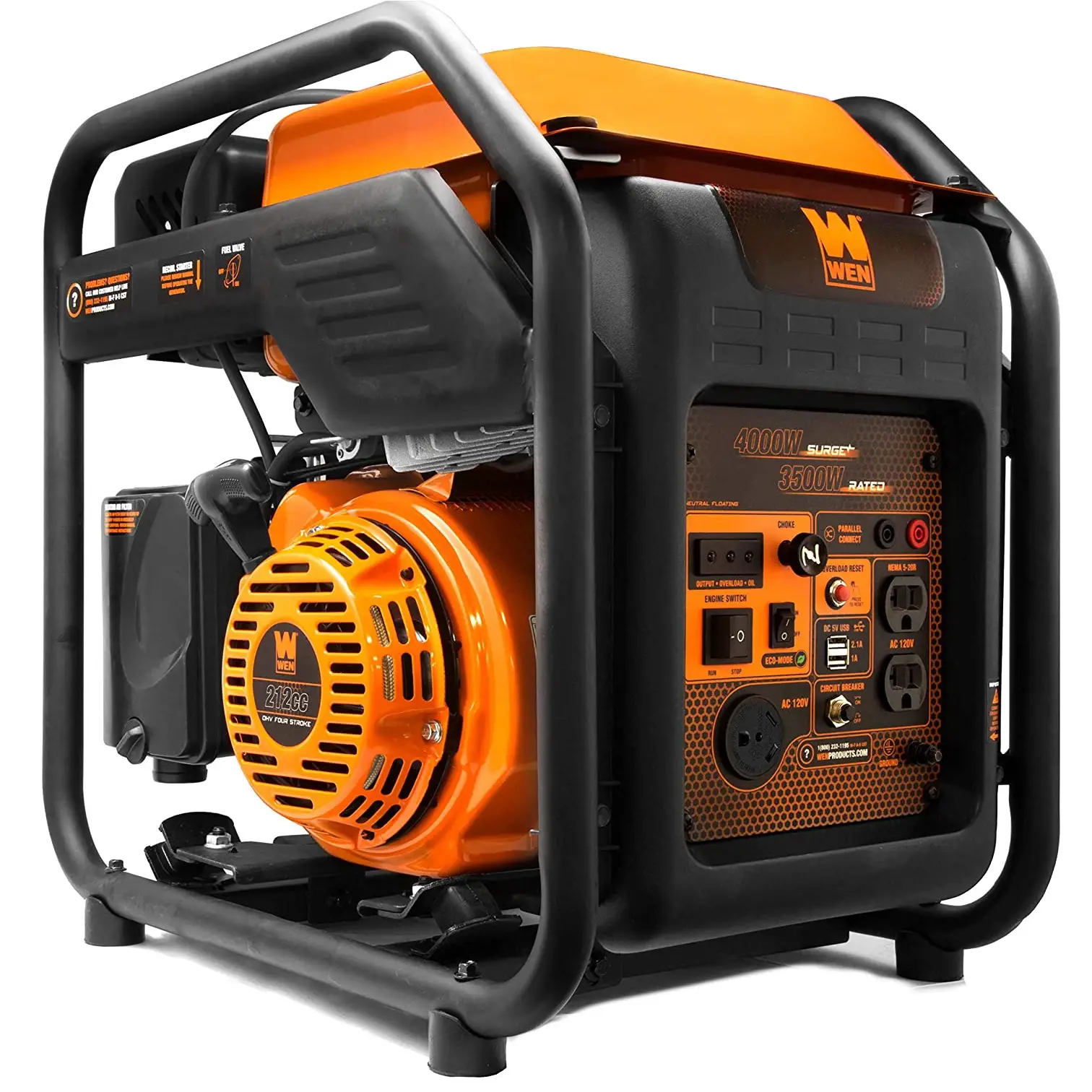
- Brand WEN
- Wattage 4000 watts
- Item Weight 66.1 Pounds
Choose the Best Inverter Generators for RV
Customer’s Choice: the Best Rated Inverter Generators for RV
29 users answered this survey. Please help us improve this review!
Finding the best inverter generator for RV can seem like a daunting task. With all of the different brands and models on the market, how do you know which one is right for you? This epic guide will answer all of your questions and help you find the perfect inverter device to generate the electricity for all your needs! You will read product reviews and get useful tips to make your search easier. So, whether you are a first-time buyer or an experienced RVer, this guide has something for everyone!
Table of Contents
Generac GP3500iO: Open Frame Ready Inverter RV Generator
 Introducing the Generac GP3500iO – the perfect open frame ready inverter RV generator for camping, RV use and powering every jobsite. This powerful generator provides you with over 50% more starting capacity than other models, making it ideal for powering your most sensitive electronics.
Introducing the Generac GP3500iO – the perfect open frame ready inverter RV generator for camping, RV use and powering every jobsite. This powerful generator provides you with over 50% more starting capacity than other models, making it ideal for powering your most sensitive electronics.
With improved portability and parallel outlets, you can even charge smartphones, tablets and other electronic devices while on the go. Equipped with overload protection and PowerRush Technology, this generator is also ideal for noise-sensitive environments.
Plus, it’s lighter weight than other models make it easy to transport. Ready to use right out of the box for RV applications, this generator features a START/RUN/STOP function selector dial for ease of operation.
Portable Inverter Generator A-iPower SUA4000i, 4000 Watt
 A lot of people need a dependable way to power their electronics when they’re away from home? That is why this effective A-iPower Inverter Generator is the best choice.
A lot of people need a dependable way to power their electronics when they’re away from home? That is why this effective A-iPower Inverter Generator is the best choice.
This small, gas-powered device is perfect for camping, tailgating, RV use, and home emergencies. Its operation is not loud. The device comes equipped with a 4-stroke motor. That is why this inverter generator is ideal for sensitive electronics. Among them are phones, televisions, and laptops.
The low oil alert light lets you know when it’s time to refuel, while the built-in telescoping handle and wheels make it even more portable. And don’t forget the parallel outlets for operation – perfect for powering multiple devices at once. So, if you need an emergency power solution, be sure to check out the A-iPower Portable Inverter Generator.
Champion Portable Inverter Generator, 3400 Watts
 The power is always on hand for when you need it most with the reliable, ready-to use Champion Portable Inverter Generator. These two fuel (petrol/ diesel) push button start portable genset features an electric start and dual USB ports so that your devices are never without life’s little luxuries!
The power is always on hand for when you need it most with the reliable, ready-to use Champion Portable Inverter Generator. These two fuel (petrol/ diesel) push button start portable genset features an electric start and dual USB ports so that your devices are never without life’s little luxuries!
This device has a runtime of up to 7.5 hours, making it perfect for camping, tailgating, DIY projects, and more. With a powerful and reliable engine, this generator is perfect for those who need lights during an emergency. The 3-position ignition switch makes it easy to start at any time without worrying about fuel level indicators stopping you from doing so!
The Champion Portable Inverter Generator is ready to deliver power when you need it most. It features a quick-touch panel with two 120 V household outlets and can be used anywhere in your home or business without worrying about outlet boundaries, meaning this generator will never fail you!
Super Quiet Portable Inverter Generator iGen4500 from Westinghouse
 This is a portable, dependable device to generate electricity. It is compliant with CARB emissions standards. This Inverter Generator is powered with gas and is equipped with fuel level and power output indicators. Moreover, it has a RV-Ready 30-Amp outlet.
This is a portable, dependable device to generate electricity. It is compliant with CARB emissions standards. This Inverter Generator is powered with gas and is equipped with fuel level and power output indicators. Moreover, it has a RV-Ready 30-Amp outlet.
The Generac Power Everywhere G20 Generator offers a tank volume of 3.4 gallons, which provides enough fuel for its recoil start and remote key fob capabilities with 120V household outlets or 2 USB ports on top! It also has 5 total power points including one duplex outlet perfect if you’re in need to charge multiple devices at once while copying other hardships during an emergency situation.
The folding handle and digital display make this generator easy to carry, while its fuel efficiency means you’ll never have problems finding an outlet when on the move.
WEN GN400i RV-Ready Inverter Generator with Open Frame
 The WEN RV-Ready Generator is a lightweight and compact power solution for your next camping trip or tailgate party. This reliable, portable device can provide all of the essentials from phones to computers with just one push!.
The WEN RV-Ready Generator is a lightweight and compact power solution for your next camping trip or tailgate party. This reliable, portable device can provide all of the essentials from phones to computers with just one push!.
This device produces clean power which is safe for use with sensitive electronics, and with a long runtime, you’ll never have to worry about being left in the dark. To ensure your family’s safety in case of an emergency, this generator has a parallel-ready panel that allows it to be connected with another unit for increased power.
And with a quiet operation, you’ll never have to worry about disturbing your neighbors. So, whether you’re looking for a little extra power for your next outdoor excursion or you need a reliable backup generator for emergencies, the WEN GN400i is the perfect solution.
Buyer’s Guide
How Does a Generator Work?
A generator is a machine that converts mechanical energy into electrical energy. The most common type of generator is an alternator, which uses the rotation of a magnet to create an electric current.
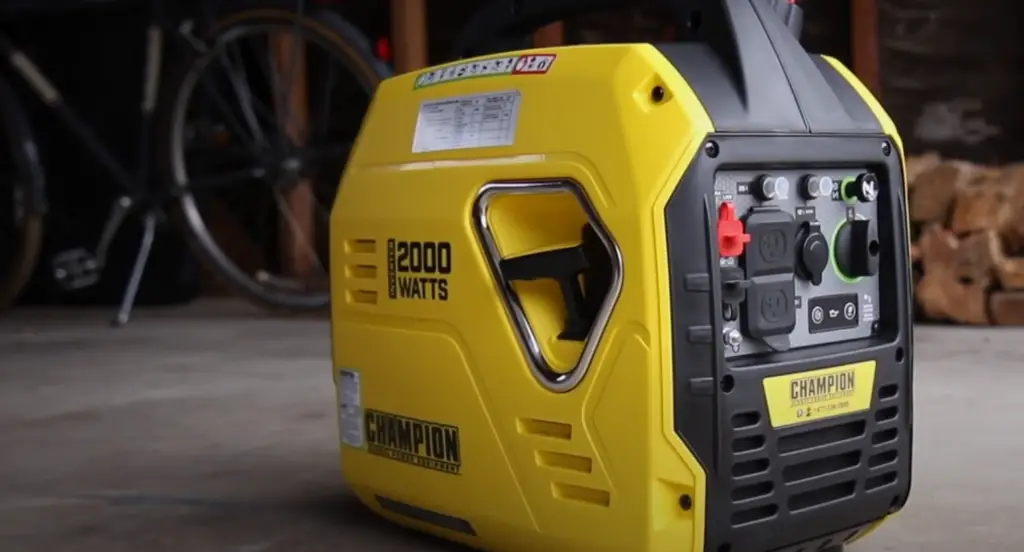
Generator power can be used to charge electronic devices such as RV air conditioners and televisions. Inverters are specifically designed generators that produce clean, safe electricity for use with sensitive electronic equipment.
If you’re looking for a reliable way to power your RV while on the road, then a good inverter generator is a must-have piece of equipment. This device can provide you with the electrical power you need to run all of your appliances, without having to rely on noisy and polluting gas generators [1].
What Is an Inverting Generator?
An inverting generator is a portable power source that can be used to run sensitive electronics like RV appliances. It does this by converting the DC current from your RV battery into clean, pure AC voltage – making it perfect for those who want their electronics protected while they’re out on trips!
They also come in a variety of sizes, so you can find one that fits your needs.
These devices were developed specifically for use with RVs, so they are designed to be lightweight and portable. They also have a built-in handle and/or wheels for easy transport [2].
Inverter Generator vs Generator (Conventional)
The first question you might be asking yourself is what the difference between an inverter generator and a conventional generator is. Simply put, an inverter generator has circuitry that converts DC power to AC power, while a conventional generator produces AC power directly. This makes inverter generators much more fuel-efficient, as they don’t have to waste energy-generating power that is then converted to AC.
Another big advantage of inverter generators is that they produce clean, stable power. This makes them ideal for sensitive electronics like laptops, smartphones, and tablets. Conventional generators produce “dirty” power, which can cause problems with these devices. Inverter generators are also quieter than conventional generators, making them a better choice for camping and other outdoor activities.
Fuel Type for Generator
Gasoline
The gasoline generators are the most popular type of generator, and they work by burning gasoline to create electricity. They are relatively affordable, easy to start and generate enough power for most applications. However, they also produce emissions, which may not be ideal for every situation [3].
The main downside of gasoline generators is that they require regular maintenance to keep them running properly. You’ll need to change the oil regularly, and make sure that the air filter is clean. Additionally, gasoline generators can be quite loud, so they may not be ideal for use in residential areas.
Finally, gasoline generators can be a little bit dangerous if not handled correctly. Make sure you store fuel safely and always use caution when refueling.
Propane
Propane generators are a good option for people who want the convenience of a gasoline generator but don’t want to deal with the emissions. They work by burning propane gas to create electricity, and they are much quieter than gasoline generators.
The main downside of propane generators is that they can be more expensive than gasoline generators. Additionally, you’ll need to have a tank of propane available to run the generator. Finally, propane generators can be difficult to start in cold weather.
You will want to choose the propane generators if you have an RV, and plan camping or hunting.
Electric
Electric generators are a good option for people who want to avoid the noise and fumes of gasoline or propane generators. They work by converting mechanical energy into electrical energy, and they are available in a variety of sizes to suit your needs.
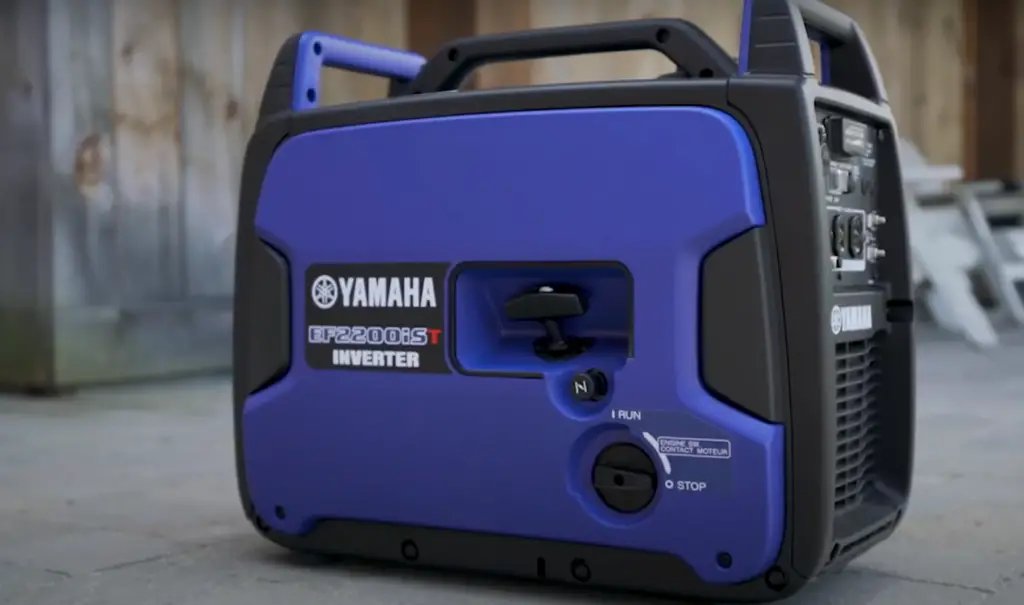
The main downside of electric generators is that they can be expensive. Additionally, you’ll need to have a reliable source of electricity to run the generator. Finally, electric generators can be bulky and difficult to move around. You will want to choose the electric generator if you are looking for an emergency backup power supply.
What to consider when choosing the Inverter Generator
Power Output
When shopping for an inverter generator, it’s important to first consider what you will be using it for. Inverter generators come in a range of power outputs, so if you need a lot of power, make sure to choose one that can handle your needs.
If you plan on using your inverter generator for tailgating or camping, a model with a power output of around 3000 watts should be sufficient. If you need to run larger appliances, like an air conditioner, you will need a generator with a higher power output of 5000 watts or more.
Modes of Operation
Inverter generators offer two modes of operation: standard and economy. The standard mode is designed for intermittent use, while the economy mode is more fuel-efficient and can be run for longer periods. If you plan on using your inverter generator frequently, the economy mode is the best option to save on fuel costs.
Connecting To Your Rig
In addition to the power output, you also need to consider the type of connector your inverter generator has.
Make sure to choose a model that has the connector you need.Fuel Tank Size
Another thing to consider when choosing an inverter generator is the size of the fuel tank. If you plan on using your generator for long periods, or if you will be traveling a great distance, it’s important to choose one with a large fuel tank. A model with a fuel tank size of around 12 gallons should be sufficient.
You should also consider the weight of the generator. If you plan on taking your generator with you on trips, you will want to choose a model that is lightweight and easy to transport. The average weight of an inverter generator is around 23 kg. The Inverter Generators are easy to move around because of their built-in handles and wheels.
Parallel Capability
If you need more power than what a single inverter generator can provide, many models offer the parallel capability. This means that you can connect two or more generators to get the power you need. It helps to increase the run time and is a great option if you need more power for a longer period. Just be sure that the generators you are using have the same wattage or you could damage them.
Noise Level
One downside of inverter generators is that they tend to be louder than traditional generators. If noise is a concern for you, be sure to choose a model with a low noise level. The average noise level of an inverter generator is around 51 dB.
Everyone wants to have a generator that has a low noise level, that is why you should choose the devices that have an inverter system. An inverter generator is an excellent option if you are looking for something that is portable and has a low noise level.
Inverters convert DC power to AC power, which makes them ideal for smaller devices like laptops, TVs, or smartphones. They also produce less noise than traditional generators, making them a good choice for camping or tailgating.
Warranty Information
When purchasing an inverter generator, be sure to check the warranty information. Many models come with a standard warranty of one year, but some offer longer warranties. If you plan on using your generator often, it’s important to choose one with a good warranty.
The Inverter Generator comes with excellent features that will make your life easier. It has a low noise level, making it perfect for indoor and outdoor use. It also has a parallel capability, so you can increase the power when needed. With its built-in handle and wheels, it is easy to move around. Plus, it comes with a one-year warranty.
Price
Inverter generators come in a range of prices, so you can find one that fits your budget. If you are looking for a basic model, you can find one for around $500. If you need a generator with more features such as parallel capability or a longer warranty, the price will be higher.
Extra Features
In addition to the standard features, some inverter generators come with extra features that make them a better choice for certain applications. For example, some models come with an RV connector, which is perfect for camping or tailgating. Others have a USB port, which can be used to charge cell phones or other devices.
Be sure to consider the extra features when choosing an inverter generator. If you need a model that has a RV connector, for example, choose a model that offers that feature.
What are watts?
The watt is the SI-derived unit of power. It measures the rate of energy conversion or expenditure. Inverter generators vary in wattage, so it’s important to know how many watts your device needs to run properly. You can find this information in the manual or on the device’s Energy Star sticker.
Wattage is usually measured in watts, but it can also be measured in volt-amps (VA). A watt is equal to one volt-amp. A kilowatt is 1000 watts. A megawatt is one million watts.
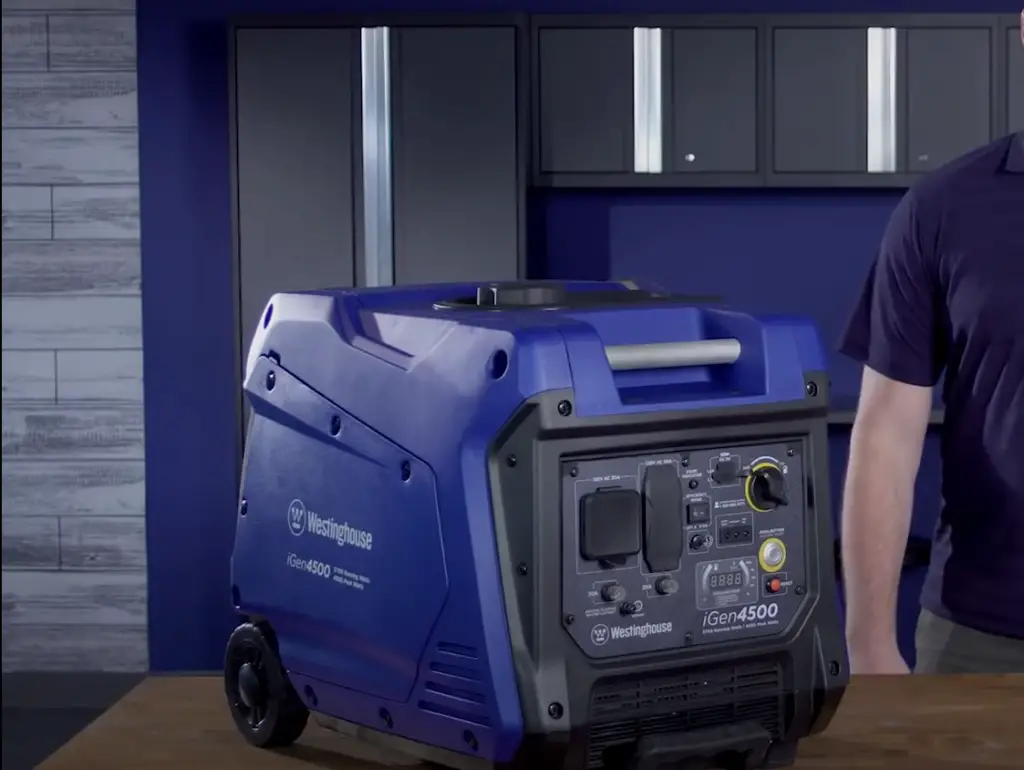
If you have a 1000-watt generator, it can provide up to 1000 watts of continuous power. It has a running time of up to 12 hours at 25% load with a full tank of gas.
The 2000-watt generator can provide up to 2000 watts of continuous power. It has a running time of up to eight hours at a 50% load with a full tank of gas.
The 3500-watt generators can provide up to 3500 watts of continuous power. It has a running time of up to six hours at a 50% load with a full tank of gas.
This is the maximum wattage the generator can provide without overloading and damaging the unit.
Inverter generators are often used in conjunction with solar panels. If you’re using a solar panel to charge your batteries, you’ll need an inverter to convert the DC power from the panel into AC power that your devices can use.
Some inverters come with built-in chargers, which can be helpful if you’re using a solar panel to charge your batteries [4].
Can You Run Your RV on a Portable Generator?
If you’re wondering if you can run your RV on a portable generator, the answer is yes – but there are a few things to consider. First of all, you need to make sure that your RV is equipped with a 12-volt power converter and that the generator has enough wattage to handle your rig’s needs. You’ll also need to have an adequate number of extension cords and adapters to make the necessary connections.
One thing to keep in mind is that a portable generator can only provide power while it’s running; you won’t be able to run your RV air conditioner or furnace off a generator. If you’re looking for a way to power your RV when you’re not on the road, you may want to consider investing in standby or a home backup generator.
Pros and cons of Inverter Generators for RV
There are pros and cons of using Inverter Generators for RV. One of the main benefits is that they are much quieter than traditional generators. There are other pros to consider:
- They are more fuel-efficient, saving you money in the long run.
- They are often smaller and lighter than traditional generators, making them easier to transport.
- Some Inverter Generators can be plugged into your home’s electrical system to provide backup power in an emergency.
However, there are also some drawbacks to consider:
- Inverter Generators can be more expensive than traditional generators.
- They are not always as powerful as traditional generators.
- Some Inverter Generators require special wiring to connect to an RV.
What Type of Fuel Is Best for Recreational Vehicle Generators?
Gasoline is the most popular type of fuel for recreational vehicle generators. However, diesel generators are also an option and have some advantages. Let’s take a look at the pros and cons of each type of fuel:
Gasoline-powered generators are more common, so they tend to be less expensive. They are also easier to find in stores. However, they produce more emissions than diesel-powered generators.
Diesel-powered generators are more fuel-efficient than gasoline-powered generators and produce less noise. However, they can be more expensive and harder to find in stores.
Which type of fuel is best for your recreational vehicle generator? That depends on your needs and preferences.
If you want to use your generator for long-term RVing, diesel might be a better choice.How to Connect a Portable Generator to Your RV
One of the first things you need to do when connecting a portable generator to your RV is to determine the wattage rating of the generator. This is important because you want to make sure that the generator can provide enough power for all of your electrical needs. The next step is to find an adapter that will allow you to connect the generator to your RV. There are a few different types of adapters available, so you will need to choose the one that is compatible with your generator and RV.
Once you have the adapter, the next step is to connect the generator to your RV. This can be done by plugging the adapter into the generator and then plugging the adapter into an available outlet on your RV. Once everything is connected, you can turn on the generator and start using the power it provides.
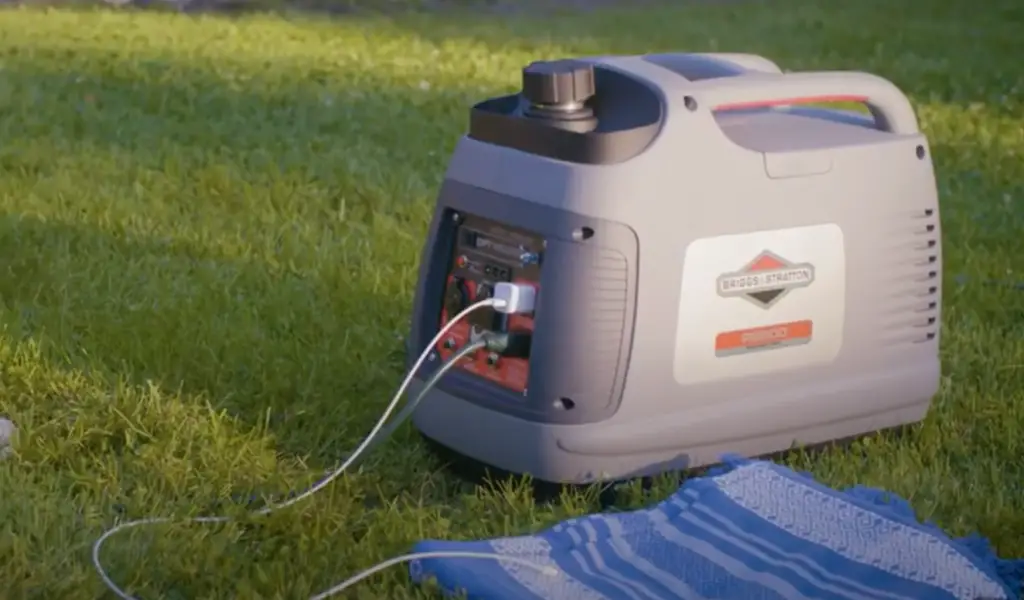
It is important to note that you should never run the generator while you are driving your RV. This can be dangerous and can also damage the generator. In addition, you should always make sure that the generator is properly grounded before using it.
Tips to Care for Your New Generator
If you just purchased a new generator, congratulations! Here are some tips to help keep it in good condition for years of use.
- Read the owner’s manual carefully before using your generator. This will tell you how to properly operate and care for your machine.
- Only run your generator outdoors in a well-ventilated area. Generators produce fumes that can be harmful if breathed in.
- Never run your generator indoors, even if the windows and doors are open. The fumes from the generator can quickly build up and cause health problems.
- Make sure the generator is placed on a level surface so it won’t tip over.
- Keep flammable materials like gas cans and propane tanks away from the generator.
- If you’re not going to use the generator for a while, store it in a dry, cool place. Make sure to clean it thoroughly before putting it away.
- Follow these tips and your generator will last for years!
Comparison of Indicators for Choosing an Inverter Generator for RV
When selecting an inverter generator for your RV, several indicators need to be considered to ensure optimal performance and compatibility. The following table provides a comparison of various indicators to help you make an informed decision.
| Indicator | Description |
|---|---|
| Power Output | The maximum power the generator can provide, measured in watts. Consider your RV’s power requirements and choose a generator with sufficient output to handle your appliances and devices. |
| Noise Level | The noise produced by the generator, typically measured in decibels (dB). Lower dB values indicate quieter operation, which is important for a peaceful camping experience. |
| Weight | The weight of the generator, usually measured in pounds (lbs) or kilograms (kg). A lighter generator is easier to transport and store, but ensure it offers the necessary power for your needs. |
| Run Time | The duration the generator can run on a full tank of fuel. Consider the fuel efficiency and choose a generator that offers an adequate run time to avoid frequent refueling. |
| Size | The physical dimensions of the generator. Ensure it can fit in your RV’s storage space and is easy to handle during setup and maintenance. |
| Fuel Type | The type of fuel the generator requires, such as gasoline, propane, or diesel. Consider fuel availability and cost when selecting a generator. |
| Parallel Capability | Whether the generator can be connected to another generator to increase power output. This feature is useful if you anticipate needing extra power in the future. |
| RV Compatibility | Check if the generator is specifically designed for RV use and offers features like RV-ready outlets, surge protection, and compatibility with sensitive electronics. |
| Price | The cost of the generator. Consider your budget and compare prices to ensure you get the best value for your money. |
| Brand Reputation | The reputation and reliability of the generator brand. Research customer reviews and ratings to gauge the brand’s track record for quality and customer satisfaction. |
By considering these indicators and comparing different inverter generators, you can find the one that best suits your RV power needs, noise preferences, budget, and other specific requirements.
Note: This table is for illustrative purposes only and does not compare specific models or products.
FAQ
How does an inverter generator work?
An inverter generator produces AC power through a process of conversion. The engine runs on gasoline or diesel and powers an alternator, which in turn creates electricity. This electricity is then converted to clean, pure sine wave AC power by the inverter module.
What are the benefits of inverter technology?
Inverter generators offer several benefits, including:
- Quiet operation – Inverter technology eliminates the need for a traditional alternator, which means the generator runs much more quietly.
- Fuel efficiency – Inverter generators are more fuel-efficient than traditional generators because they run at lower speeds and use less gas.
- Clean power – Inverter generators produce clean, pure sine wave AC power, which is ideal for sensitive electronics.
- Portability – Inverter generators are lightweight and compact, making them easy to transport.
In addition to the benefits listed above, inverter generators are also a great choice for home backup power systems.
Which are the best brands to buy from?
Many reputable brands sell inverter generators, but some of the most popular include Honda, Yamaha, and Generac.
What size inverter generator do I need for my RV?
The size of the inverter generator you need for your RV will depend on the wattage requirements of your appliances. Most RVers need a generator with at least 3000 watts of power, but you should always consult your appliance manuals to be sure.
What type of generator is best for an RV?
There are two types of generators to choose from – inverter generators and conventional generators. Inverter generators are the better choice for RVers because they produce clean, pure AC power, are more fuel-efficient, and are quieter than traditional generators.
What size generator do I need for a 30 amp camper?
If you have a 30 amp camper, you will need a generator with at least 3500 watts of power.
How many watts do I need for my RV?
The wattage requirements of your RV will vary depending on the appliances you have installed. You should consult your appliance manuals to get a precise wattage requirement. However, most RVers need a generator with at least 3500 watts of power.
What size generator do I need for a pop-up camper?
If you have a pop-up camper, you will need a generator with at least 1000 watts of power.
How do I determine what size generator I need?
To determine the size of generator you need, add up the wattage requirements of all of the appliances you want to run at the same time. This number is your wattage requirement. Then, choose a generator with a wattage rating that is equal to or greater than your wattage requirement.
Do I need a transfer switch?
A transfer switch is not necessary for an RV, but it is a good idea to have one. A transfer switch allows you to safely connect your generator to your home’s electrical system. This way, you can run your appliances inside the RV while still keeping the rest of your home powered up.
How much power do I need for the typical RV AC unit?
The average RV AC unit requires between 2500 and 3000 watts of power. If you have an RV AC unit, be sure to choose a generator with enough wattage to accommodate it.
What size generator do you need for a 2000 square foot house?
A generator with at least 5000 watts of power is typically needed to provide backup power for a 2000 square foot house.
Can you run a generator while driving?
No – it is not safe to run a generator while driving. Always park your RV in a safe location before running the generator.
Safety considerations to running a generator while sleeping in the RV?
It is important to follow the safety guidelines for running a generator while sleeping in your RV. Make sure the generator is located in a well-ventilated area and never run it inside the RV. Additionally, be sure to unplug all of your appliances from the generator before going to bed. This will help prevent any accidental power surges from occurring.
Can I run my RV air conditioner with an inverter generator?
Yes, you can run your RV air conditioner with an inverter generator. Inverter generators are specifically designed to provide clean and stable power, making them suitable for powering sensitive electronics and appliances like air conditioners.
Are inverter generators quieter than conventional generators?
Yes, inverter generators are generally quieter than conventional generators. They are equipped with advanced technology that allows them to adjust engine speed based on the power load, resulting in reduced noise levels. This makes them ideal for RV use as they produce less noise pollution and provide a more comfortable camping experience.
Can I charge my RV batteries with an inverter generator?
Yes, you can charge your RV batteries with an inverter generator. Most inverter generators have built-in DC outlets or the option to connect an external battery charger. By providing a stable power source, inverter generators can efficiently charge your RV batteries while you’re on the go.
Do inverter generators save fuel compared to conventional generators?
Yes, inverter generators are known for their fuel efficiency compared to conventional generators. Inverter technology allows the generator to adjust its engine speed based on the power demand, resulting in better fuel consumption. This feature not only saves fuel but also reduces exhaust emissions, making them more environmentally friendly.
Can I parallel two inverter generators for increased power output?
Yes, many inverter generators offer the capability to be paralleled, allowing you to combine the power output of two generators. This feature is particularly useful when you require more power for your RV appliances or air conditioning. By paralleling the generators, you can effectively double the power capacity while maintaining the benefits of clean and stable power.
Can I run sensitive electronics with an inverter generator?
Yes, you can safely run sensitive electronics, such as laptops, smartphones, and televisions, with an inverter generator. Inverter technology ensures that the power produced is clean and stable, free from voltage fluctuations and surges that could potentially damage sensitive devices. This makes inverter generators an excellent choice for RV owners who rely on their electronics while on the road.
Are inverter generators more compact and portable than conventional generators?
Yes, inverter generators are generally more compact and portable compared to conventional generators. They are designed with lightweight materials and compact engines, making them easier to transport and store in your RV. The smaller size and ergonomic handles of inverter generators contribute to their convenience and ease of use.
Can I run my inverter generator overnight while sleeping in my RV?
It is generally not recommended to run any generator, including an inverter generator, overnight while sleeping in your RV. Although inverter generators are quieter and produce fewer emissions compared to conventional generators, there is still a risk of carbon monoxide poisoning if the generator is not properly ventilated. It’s important to prioritize your safety and follow the manufacturer’s instructions regarding generator usage to prevent any potential hazards.
Useful Video: Top 10 Best Portable Inverter Generators for RV, Camping & Home
Conclusion
Inverter generators are a great choice for RVers who need clean, reliable power. They’re quiet, efficient, and easy to use, making them a perfect addition to any rig. The Inverter Generators are mainly used for the charging of batteries, laptops, small appliances, and for running the air conditioners.
Moreover, these generators are perfect for powering sensitive electronics and come with a host of features that make them perfect for on-the-road use. To choose the right one for your needs, it’s important to consider the wattage you need, the type of fuel you want to use, and the features that are most important to you.
References:
- https://economictimes.indiatimes.com/small-biz/productline/power-generation/electric-generator-an-basic-introduction-to-how-generators-work-their-features-and-applications/
- https://www.consumerreports.org/inverter-generators/pros-and-cons-of-inverter-generators
- https://www.morrismachinery.co.uk/what-fuel-type-do-i-need
- https://outdoormiles.com/choosing-an-rv-inverter-generator/



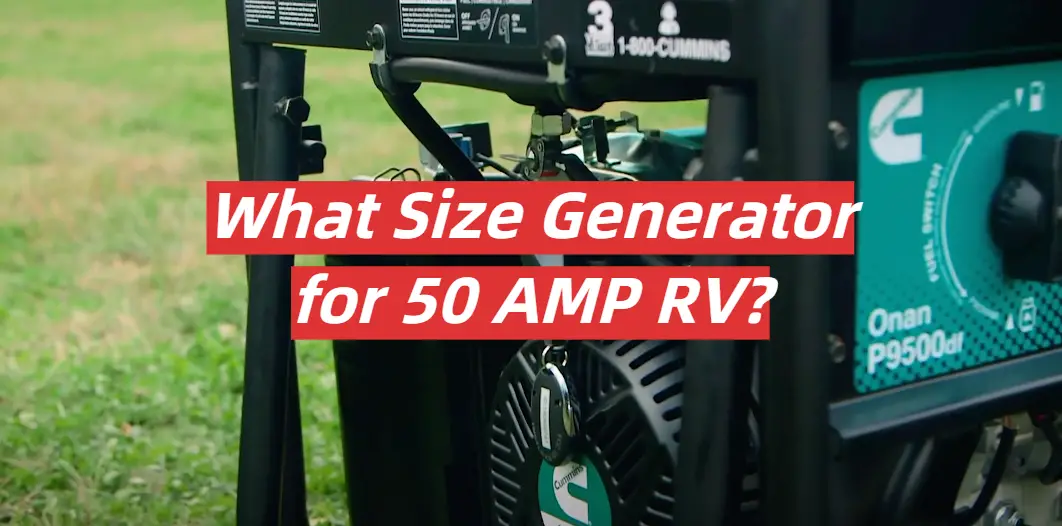
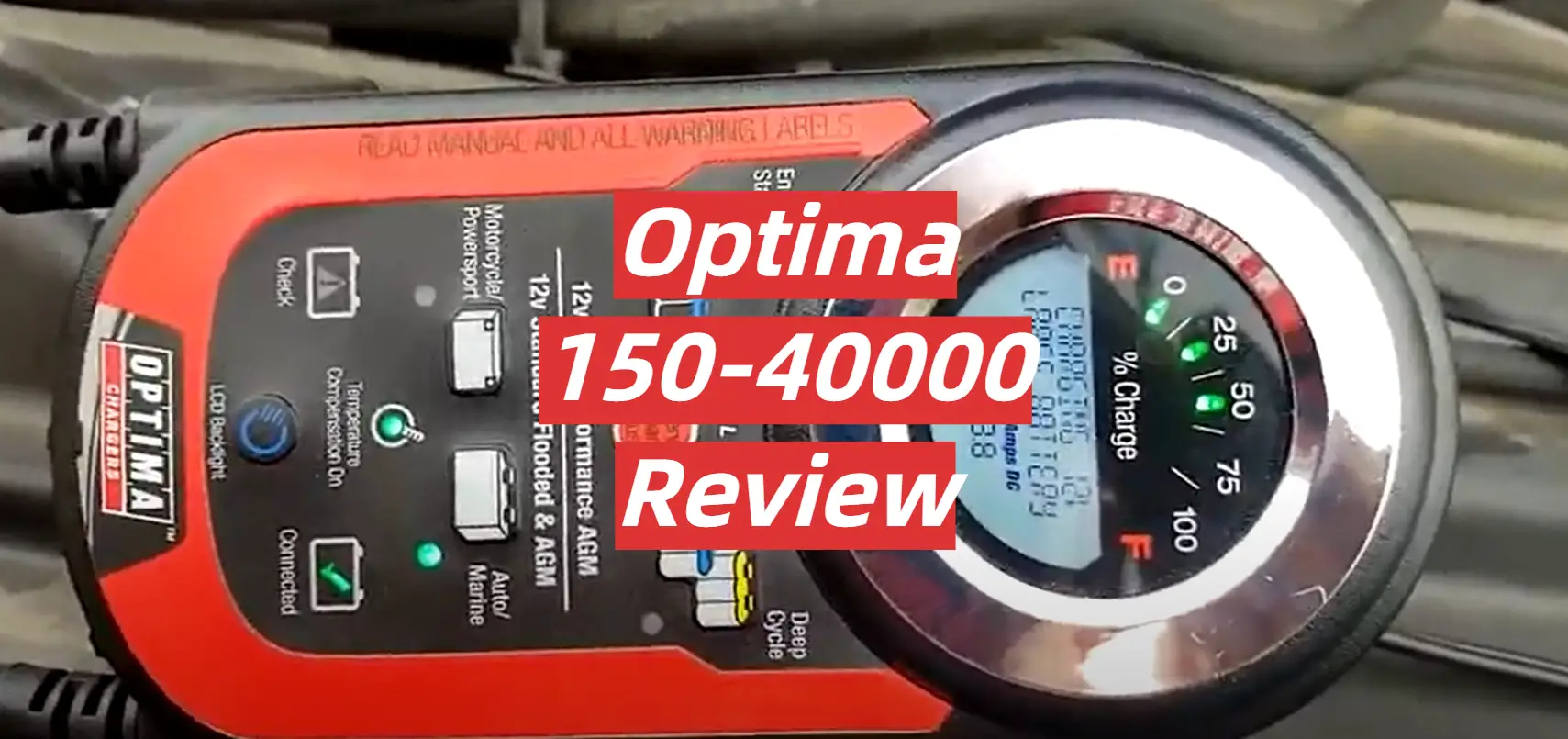

Leave a Reply